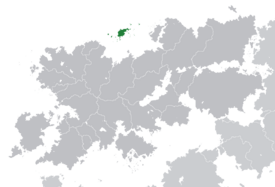Keuland
This article is incomplete because it is pending further input from participants, or it is a work-in-progress by one author. Please comment on this article's talk page to share your input, comments and questions. Note: To contribute to this article, you may need to seek help from the author(s) of this page. |
Kingdom of Keuland Kongeriget Keuland (Nordic) | |
|---|---|
| Motto: Alltid Klar ("Always Ready") | |
| Anthem: På Vikingtokt On the Viking Voyage File:Https://www.youtube.com/watch?v=cr0dmoGHmJc | |
 Location of Keuland (dark green) – in Belisaria (dark grey) | |
| Political Map of Keuland Political Map of Keuland | |
| Capital and city | Kalda |
| Official language and national language | Nordic |
| Ethnic groups (2018) |
|
| Religion |
|
| Demonym(s) | Keu |
| Government | Unitary absolute monarchy |
• King | Albert I |
| Nufi Narsson | |
| Lars Torson | |
| Legislature | Storting |
| Formation | |
• Kingdom of the Nords | 750 CE |
• Personal Union with Ostmark | 1319 CE |
• Kingdom of Keuland | 1922 |
| Currency | Krone (kr) (KLK) |
| Date format | dd/mm/yyyy (CE) |
| Driving side | left |
| Calling code | +747 |
| ISO 3166 code | KL |
| Internet TLD | .kl |
Keuland (Nordic: Kongeriket Keuland), officially known as the Kingdom of Keuland, is a unitary absolute monarchy of nearly 5 million people consisting of an island archipelago north of Belisaria. It shares maritime borders with Cynereth, Valgtea and Erishland. The official and national language is Nordic.
Keuland is generally regarded as a nexus point of the Nords, who originally consisted of various tribes that ruled over individual islands, and founded petty jarldoms. These states were based on either clans or tribes and by the 5th century, each of these small states had things (local or regional assemblies) for negotiating and settling disputes. By the 6th century a more centralized authority emerged in the form of the king, who ruled from the largest island, known as Suraland.
From the 7th to the 12th centuries, Keuland was a source of Vikings. The seafaring warlords aggressively raided, looted and pillaged coastal regions as far east as Cynereth and as far west as Norumbia, and as far south as Latium. By the 13th century however, the majority of the lands that at one time the vikings raided with impunity were able to defend themselves, eventually leading to a period in which Keuland became a hub of pirates and mercenaries, in addition to a general decline of the kingdom’s power.
A long period of decline between the 12th and 14th centuries was eventually mitigated by a personal union forming with the Kingdom of Ostmark, under King Magnus VIII. The Kingdom of Keuland and Ostmark remained in a personal union until the early 20th century, during which time the base of power was shifted to Ostmark. When Ostmark was overthrown by a revolution and reformed as Valgtea, the king and government removed to Keuland, where they remain.
As a result of its separation from Ostmark, Keuland has developed a nationalistic, totalitarian system of government. Under Keuland’s 1920 Statute, the King is both the head of state and the head of government, with full executive authority, including emergency powers since 1920. The country has been under hypothetical martial law since independence. Keuland faces a strong international sanctions regime by an array of other nations, featuring numerous embargoes and high-level sanctions that significantly limit its presence in global affairs.
History
Geography
Climate
Topography
Flora and fauna
Politics and government
Keuland is a unitary absolute monarchy with a totalitarian political system. The Monarch is the head of state and government and is advised by and presides over the Storting, which he appoints. The King appoints councilors to represent the various fylker of Keuland. These councilors serve at the pleasure of the King indefinitely. Presently there are 170 Councilors, though this number may change depending on population shifts, though each flyker is entitled to at least one councilor.
The King presides over three councils, consisting of the Council of Ministers, the Security Council and the Privy Council. The Privy Council advises the king on policies and consists of high-ranking members of the Storting and military. The Security Council consists of high-ranking military officials who advise the kings on matters relative to national defense. The Council of Ministers consists of members of the Storting that collaborate with the king on day-to-day administrative administrative functions of government.
Law and criminal justice
Keuland has a common law system that is descended from the Things of ancient times. The structure of the common law courts in Keuland begins with the magistracy. Each flyker has its own Magistrate, all of whom are local residents. All magistrates are appointed by the Privy Council, and serve indefinitely at the king’s pleasure.
Above the local magistrates are the Appellate Magistrates, who serve as intermediaries below the Chief Magistrate of Keuland. Normally, the Chief Magistrate serves as the highest appellate court in Keuland, although in some instances cases are heard first before the Chief Magistrate. These cases include treason, crimes against the state, sedition and espionage. All decisions rendered by the Chief Magistrate are final and binding upon all the lower courts, although any decision rendered by the Chief Magistrate must also be affirmed by the king.
Administrative divisions
Keuland consists of forty flyker led by councilors appointed by the king. The flyker generally reflect the historical boundaries, with various islands comprising individual counties, while smaller ones are administered as one unit. The areas of responsibility for the county councils, organized by the councilors, are social services, infrastructure development and “domestic tranquility.” The counties are allowed to levy taxes in order to fund these services.

